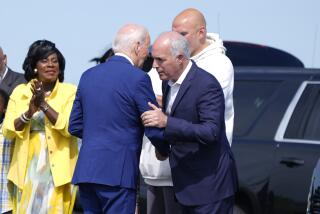Stumping Is a Risk for Bush
- Share via
WASHINGTON — In 1986, President Ronald Reagan, then two years from retirement, embarked on what he called “my last campaign”--a determined effort to retain control of the Senate for the Republican Party. Reagan focused on trying to save several first-term Republicans who had ridden in on his coattails in 1980--most notably Jeremiah Denton of Alabama, Mack Mattingly of Georgia and Paula Hawkins of Florida--along with a handful of other incumbents who appeared potentially vulnerable.
Reagan’s task was difficult. Some of the Republicans had been given what might charitably be called “mixed reviews” for their records of conservatism tinged by eccentricity. Hawkins, for example, had proposed fighting drug trafficking by ordering the Treasury Department to stop printing the $100 bill. And Denton, also marching to a different drummer, had tried to legislate chastity in teenagers. But Reagan forged ahead, visiting each state to ask his final favor of the electorate in the most direct terms. He was rebuffed in each case. Despite the president’s strength, the Democrats regained the Senate by defeating, among others, Hawkins, Denton and Mattingly.
This bit of history is worth recalling as President Bush makes a deepening commitment to campaigning for Republicans in an attempt to retake the Senate this year. The lesson in Reagan’s experience is that even extremely popular presidents cannot tell the voters whom to choose. And what this means, in turn, is that the White House is taking a significant political risk by putting presidential stature so clearly on the line.
Bush could end up losing further ground for his party in a Senate the Democrats now hold by a single seat. He could also nourish doubts among his fellow Republicans that he can be valuable to them the next time around. No president likes muttering in the ranks of his own party. Quite beyond the Republican attitude, any sign of weakness on Bush’s part might embolden the Democrats who have been so intimidated by the president’s popularity. Their fear of being accused of unpatriotic behavior would dissipate pretty quickly if they were to smell weakness--or whatever aroma arose from the Republicans’ use of patriotism as the final defense.
Why the White House is willing to take the risk is puzzling. Long study of election patterns makes it plain that voters don’t often make two-step decisions in casting a vote. They don’t support one candidate because they like another except in rare cases. They choose the person they think is best for the office rather than casting a vote that simply sends a message.
There have been, of course, some congressional elections nationalized by voter anger at least to the point that some clear line of popular reaction could be identified as making a difference in close House districts and Senate contests.
That was the case, for example, in the “Watergate landslide” of 1974, when enmity toward the disgraced Richard M. Nixon was clearly a special burden for the Republicans. And it was also the case in 1994, when voters reacted against the insularity of the Democratic leadership of Congress and against President Bill Clinton and his clumsy handling of the health-care financing issue. The Democrats in 1974 and the Republicans in 1994 gained more than 50 seats in the House of Representatives.
If public opinion polls are accurate, Bush remains extremely popular. His approval rating has slipped from close to 90% to about 70%, but that is still a gaudy figure. There are, however, some signs in the polling data that suggest that many voters are making a distinction between supporting their president in time of war and giving him high marks for his performance in office. Americans do understand the difference between standing up to Osama bin Laden and setting policy on the economy, the environment and education.
And, whatever the poll numbers, what is lacking is any reason to believe that the voters in South Dakota think their support for the president requires them to throw out Sen. Tim Johnson, the Democrat most recently targeted by Bush. Would the election of Republican Rep. John Thune strengthen the war against terrorism? Or make Bush more effective in dealing with the Middle East?
In political terms, the president’s greatest value right now lies in his ability to raise money for his party and its candidates and to call attention to the John Thunes of the 2002 campaign. But in terms of his own prestige, Bush has much at risk and little to gain. This campaign is not a referendum on the war against terrorism. Everyone’s on the same side of that one.
More to Read
Get the L.A. Times Politics newsletter
Deeply reported insights into legislation, politics and policy from Sacramento, Washington and beyond. In your inbox twice per week.
You may occasionally receive promotional content from the Los Angeles Times.










